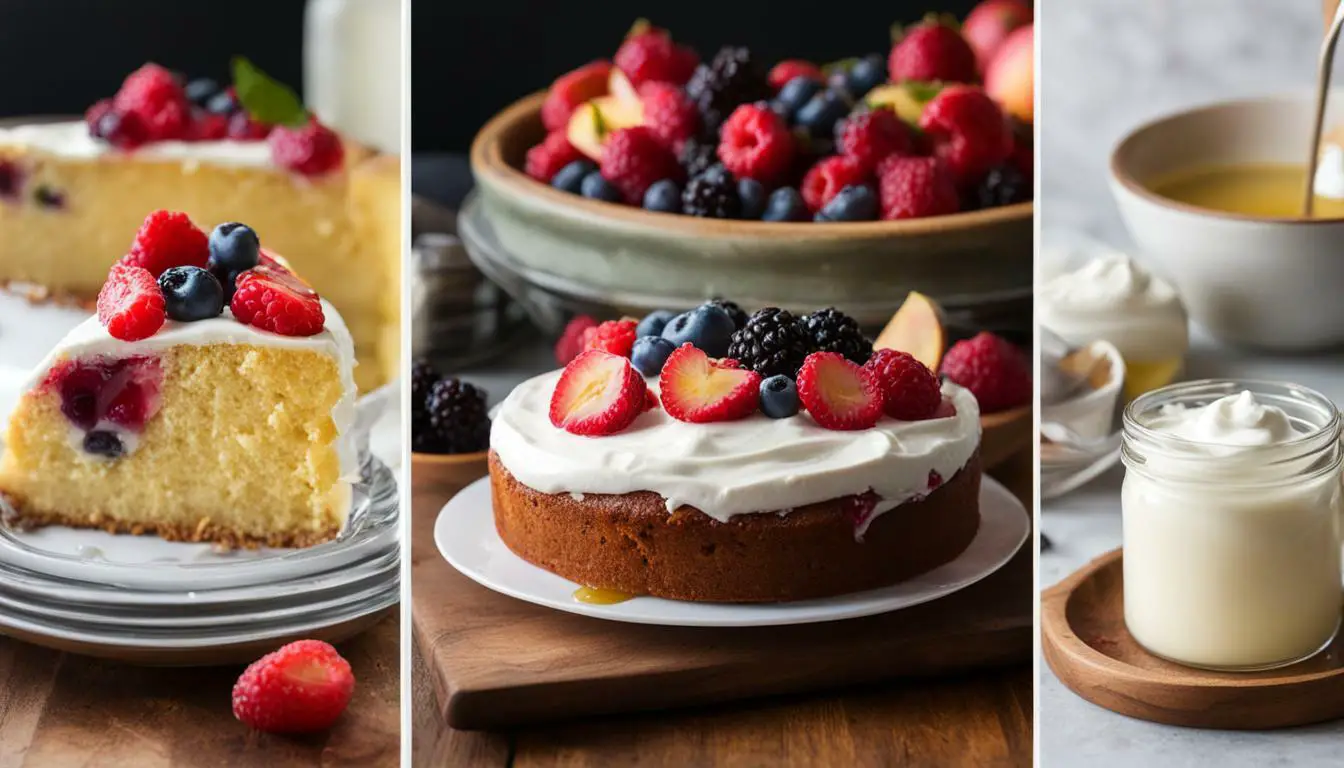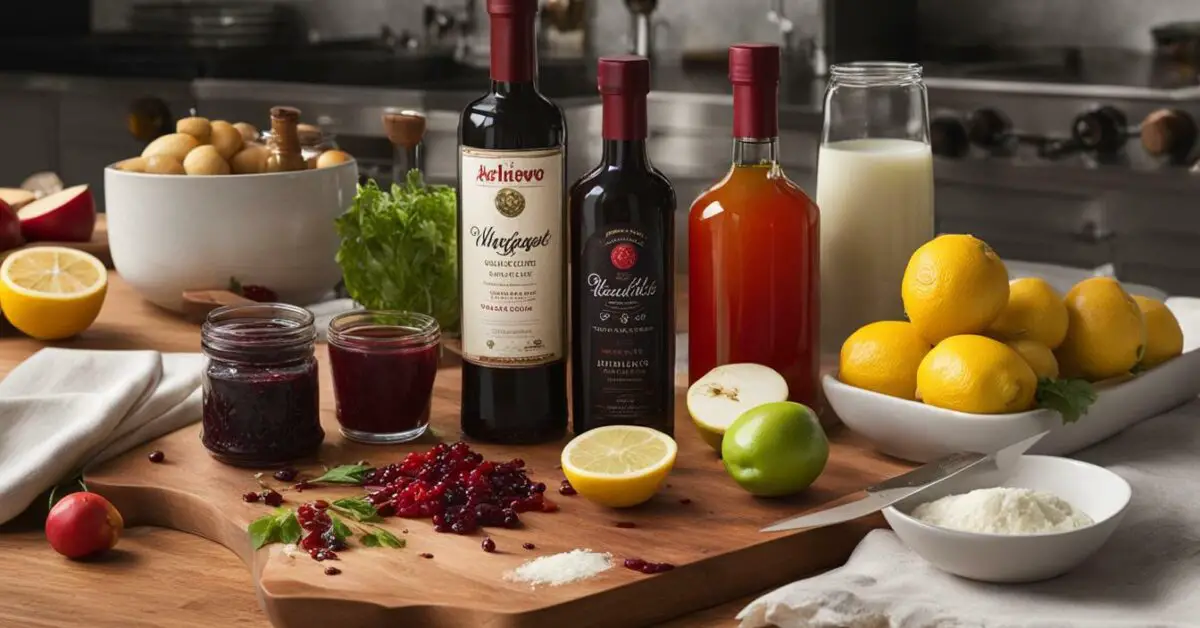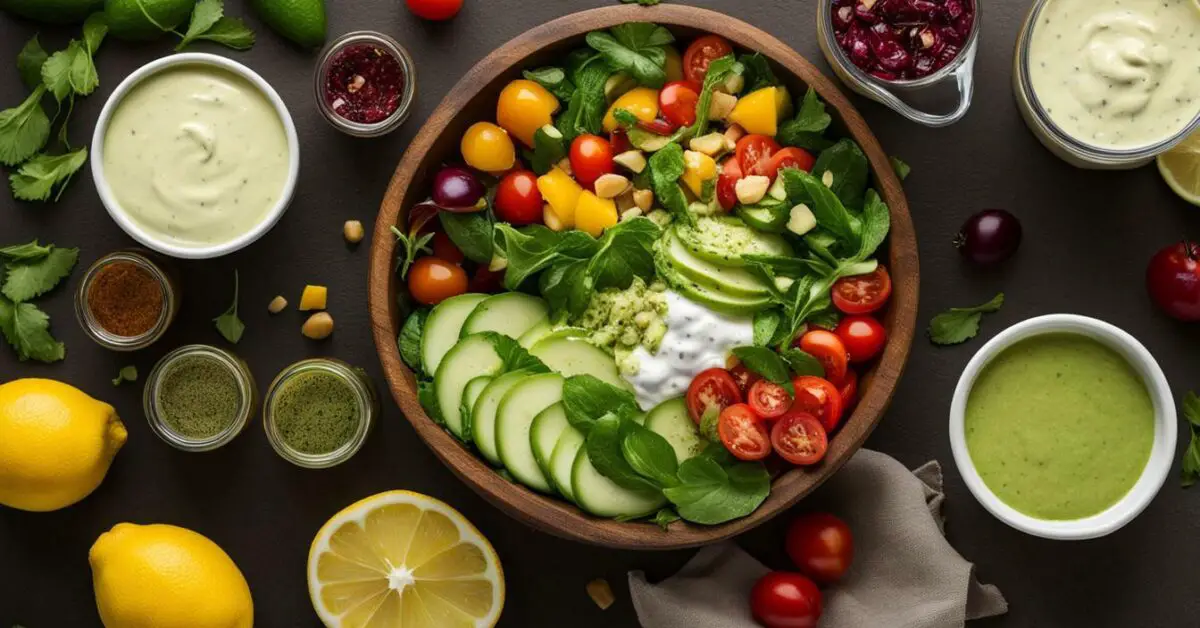
This post may contain affiliate links. Please read my disclosure for more information.
Looking for alternatives to vinegar in your cake recipe? Discover the 9 best substitutes that will keep the rich, indulgent flavor intact.
When you don’t have vinegar on hand for your cake recipe, there are several substitutes you can use. Lemon juice is an excellent alternative, with a similar level of acidity to vinegar. Apple cider vinegar can also be used, as it has a milder flavor and lower acidity. Cream of tartar, yogurt, and white wine vinegar are other good options.
On the other hand, balsamic vinegar, white wine vinegar, and malt vinegar are not recommended substitutes due to their strong flavors. Other substitutes include rice vinegar, white balsamic vinegar, and lemon or lime juice.
It’s important to note that vinegar is an essential ingredient in cake recipes as it reacts with baking soda to create a light and fluffy texture, so it’s best to use a substitute rather than skipping it altogether.
Lemon Juice
When vinegar is unavailable, lemon juice can be a great substitute in your cake recipe, providing the same level of acidity and maintaining the delicious flavor. Lemon juice offers a tangy and citrusy taste that works well in a variety of cake recipes. The acidity in lemon juice reacts with baking soda, creating the desired rise and texture in your cakes.
To use lemon juice as a substitute for vinegar in your cake, simply replace an equal amount of vinegar called for in the recipe with lemon juice. For example, if the recipe calls for 1 tablespoon of vinegar, use 1 tablespoon of lemon juice instead. This substitution will give your cake a subtle lemony flavor that complements various cake flavors, such as vanilla or citrus.
Alternative substitutes
- Apple cider vinegar: With its mild flavor and lower acidity, apple cider vinegar can be another suitable substitute for vinegar in cakes.
- Cream of tartar: Often used in combination with baking soda, cream of tartar can provide the acidity needed for leavening in cakes.
- Yogurt: The tanginess of yogurt can help replicate the acidity and moisture that vinegar brings to cake recipes.
- White wine vinegar: Although similar to vinegar, white wine vinegar has a milder flavor profile that can be used as a substitute.
Remember, vinegar is an essential ingredient in cake recipes as it reacts with baking soda to create a light and fluffy texture. So, when vinegar is not available, these substitutes, including lemon juice, can help you achieve the desired outcome without compromising on taste and texture.
Other Substitutes
Apart from lemon juice, there are various other substitutes you can use in your cake recipes. Apple cider vinegar, cream of tartar, yogurt, and white wine vinegar are some excellent options that can maintain the desired acidity level. These substitutes offer unique flavors and can add a new twist to your cakes.
- Apple cider vinegar: With its mild flavor and slightly fruity notes, apple cider vinegar is a great substitute for vinegar in cakes. It pairs well with apple-based desserts and adds a subtle tanginess.
- Cream of tartar: Made from tartaric acid, cream of tartar can be used as a substitute for vinegar in cakes. It helps to activate baking soda and create a lighter texture, especially in angel food cakes.
- Yogurt: Yogurt adds moisture and a creamy texture to cakes while providing a tangy flavor. It works as a suitable vinegar substitute in recipes that call for a more subtle acidity.
- White wine vinegar: Similar to apple cider vinegar, white wine vinegar has a milder taste and can be used in cakes that require a softer acidity. It is commonly used in recipes that pair well with white wine flavors.
However, it’s best to avoid substitutes like balsamic vinegar, white wine vinegar, and malt vinegar due to their strong flavors. These may overpower the other ingredients in your cake and alter the overall taste. Instead, opt for alternatives like rice vinegar, white balsamic vinegar, or citrus juices like lemon or lime. These substitutes can provide the right amount of acidity without overwhelming the flavor profile of your cake.
Summary:
When vinegar is not available, there are several substitutes you can use in your cake recipes. Apple cider vinegar, cream of tartar, yogurt, and white wine vinegar are excellent options that can maintain the desired acidity level without compromising taste. On the other hand, it’s advisable to avoid substitutes like balsamic vinegar, white wine vinegar, and malt vinegar due to their strong flavors. Instead, consider using rice vinegar, white balsamic vinegar, or citrus juices like lemon or lime. These alternatives will help you achieve a delicious cake while maintaining the right balance of flavors.
Conclusion
In conclusion, when vinegar is not available, there are several substitutes to choose from to ensure your cakes turn out delicious. Using substitutes like lemon juice, apple cider vinegar, or cream of tartar can help you maintain the desired acidity level, resulting in a perfectly baked cake. Remember, vinegar is an essential ingredient in cake recipes, so it’s best to use a substitute rather than omitting it entirely.
Factual data: When you don’t have vinegar on hand for your cake recipe, there are several substitutes you can use. Lemon juice is an excellent alternative, with a similar level of acidity to vinegar. Apple cider vinegar can also be used, as it has a milder flavor and lower acidity. Cream of tartar, yogurt, and white wine vinegar are other good options. On the other hand, balsamic vinegar, white wine vinegar, and malt vinegar are not recommended substitutes due to their strong flavors. Other substitutes include rice vinegar, white balsamic vinegar, and lemon or lime juice. It’s important to note that vinegar is an essential ingredient in cake recipes as it reacts with baking soda to create a light and fluffy texture, so it’s best to use a substitute rather than skipping it altogether.
By using one of these substitutes, you can still achieve the desired flavor and texture in your cakes without compromising on taste. Whether you opt for lemon juice for a citrusy twist or apple cider vinegar for a more subtle flavor, these alternatives ensure that your cakes are not missing out on the crucial acidity that vinegar provides. Experiment with different substitutes and find the one that suits your taste preferences the best.
So, the next time you find yourself without vinegar in your pantry while baking a cake, don’t worry. With these substitutes at hand, you can still create a delectable treat that will impress your family and friends. Enhance your baking skills and bring out the best flavors in your cakes by utilizing the variety of substitutes available to substitute for vinegar in your recipes.
FAQ
Can I substitute vinegar in a cake recipe?
Yes, there are several substitutes you can use if you don’t have vinegar on hand.
What can I use instead of vinegar in a cake recipe?
Lemon juice, apple cider vinegar, cream of tartar, yogurt, and white wine vinegar are all good alternatives.
Can I use balsamic vinegar as a substitute for vinegar in cake?
It is not recommended to use balsamic vinegar as a substitute due to its strong flavor.
Are there any other substitutes I can use for vinegar in cake?
Other options include rice vinegar, white balsamic vinegar, and lemon or lime juice.
Why is vinegar important in cake recipes?
Vinegar reacts with baking soda to create a light and fluffy texture in cakes, so it’s best to use a substitute rather than skip it altogether.


